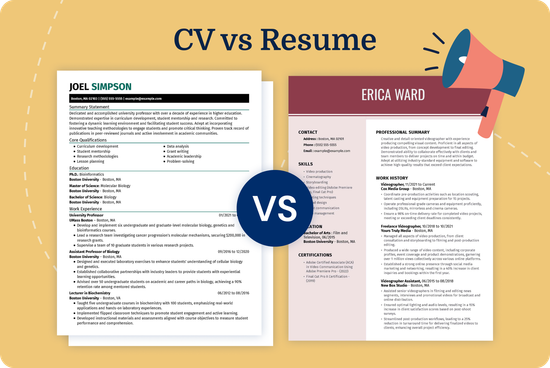- CV vs Resume vs Biodata: Compare 2 Key Differences for Successful Hospitality Jobs
- How to Craft a Winning Hospitality Resume: Essential Tips and Best Practices
- Creating a Standout CV for Hospitality Jobs: What Recruiters Want to See
- Biodata Essentials: How to Present Yourself Professionally in the Hospitality Sector
- Tailoring Your Resume for Hospitality Roles: Highlighting Relevant Hospitality Skills and Experience
CV vs Resume vs Biodata: Compare Two Key Differences for Hospitality Jobs
When applying for hospitality jobs, it’s essential to understand the differences between a CV, a resume, and biodata. Each format serves a unique purpose and is used in specific contexts, making it crucial to choose the right one to present your qualifications effectively. This article explores these three formats, providing insights into their differences and offering guidance on when and how to use each.

Understanding the Basics
Curriculum Vitae (CV):
A CV is a detailed document that outlines your entire academic and professional history. It includes sections such as education, work experience, publications, certifications, and achievements. CVs are often used for academic, research, or international positions and are typically more comprehensive than resumes.
Resume:
A resume is a concise summary of your skills, experience, and qualifications tailored to a specific job or industry. It is usually one to two pages long and focuses on relevant work experience and accomplishments. Resumes are commonly used in the United States and Canada and are preferred for most job applications, including those in the hospitality industry.
Biodata:
Biodata, short for biographical data, is a format that focuses on personal details, educational background, and work experience. It is often used in countries like India and Pakistan for job applications and may include additional sections such as personal interests and family background. Biodata tends to be less detailed than a CV and more structured than a resume.
CV vs Resume vs Biodata: Key Differences
Below is a comparison – cv vs resume vs biodata:
1. Length and Detail
- CV: Generally longer and more detailed, providing an in-depth view of your academic and professional journey. It includes comprehensive information about your research, publications, and other relevant achievements.
- Resume: Shorter and more focused, highlighting only the most relevant experiences and skills for the job you are applying for. It is designed to grab the attention of recruiters quickly.
- Biodata: Often includes personal information and may be more structured in terms of formatting. It provides a snapshot of your educational and professional background but is usually less detailed than a CV.
2. Purpose and Usage
- CV: Ideal for academic, research, and international positions where a detailed history of your qualifications is required. In the hospitality industry, a CV might be used for roles in hotel management or international hospitality chains where a comprehensive background is important.
- Resume: Best suited for most hospitality job applications, including positions in hotels, restaurants, and event management. It allows you to tailor your application to the specific job and highlight your relevant skills and experience.
- Biodata: Commonly used in certain regions and industries where personal information is valued. It might be used in hospitality roles in countries where biodata is a standard format for job applications.
Choosing the Right Format
When applying for hospitality jobs, selecting the appropriate format depends on several factors, including the job requirements and the region where you are applying. We often start thinking about CV vs Resume vs Biodata. Here’s how to choose the right one:
- Job Requirements: Review the job description to determine if a CV, resume, or biodata is preferred. Some employers may specify the format they want, so it’s essential to follow their instructions.
- Regional Preferences: Consider the common practices in the region where you are applying. For example, if you’re applying for a job in a country where biodata is the norm, using this format may be more appropriate.
- Personal Preference: If no specific format is required, choose the one that best showcases your qualifications and aligns with the job you are targeting. A resume is usually the most versatile and widely accepted format for hospitality jobs.
Tips for Creating Each Format
Creating a CV:
– Include a detailed list of your academic and professional achievements.
– Ensure your CV is well-organized and easy to read.
– Highlight your relevant research, publications, and certifications.
Crafting a Resume:
– Tailor your resume to the specific job you are applying for by highlighting relevant skills and experiences.
– Keep your resume concise and focused, typically one to two pages.
– Use action verbs and quantifiable achievements to make your experience stand out.
Writing Biodata:
– Include personal information such as date of birth, contact details, and educational background.
– Ensure the biodata is structured and easy to follow.
– Focus on presenting your qualifications and experience clearly and professionally.
Conclusion – CV vs Resume vs Biodata
Understanding the differences between a CV, resume, and biodata is crucial for effectively applying to hospitality jobs. By selecting the appropriate format and tailoring it to your specific needs, you can present your qualifications in the best possible light. Whether you’re applying for a role in hotel management, event planning, or any other hospitality sector, knowing how to use each format will help you stand out and increase your chances of landing your dream job.
With this knowledge, you can now make informed decisions about which format to use for your job applications – cv vs resume vs biodata and create documents that best showcase your skills and experience in the hospitality industry.


[…] CV vs Resume vs Biodata: Compare 2 Key Differences for Successful Hospitality Jobs […]